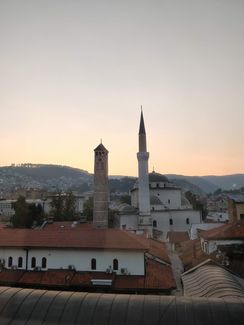 Begova Mosque, Sarajevo Begova Mosque, Sarajevo Islam on the Edges is Islam full of dynamism, uniqueness, innovativeness, and adaptation. Constantly at the edges, Muslims who live in these parts - such as Bosnia and Indonesia - embody the contradictions of belonging to the Muslim civilization but frequently being treated as outsiders, and being so close to the Other but never quite belonging. A closer look at Islam on the Edges reveals unique syntheses and strains along the stitches. It also uncovers a certain ease of being and living that is wonderfully appealing in its relaxed orientation, pulling the strangers to it with an irresistible spiraling centrifuge, as if it says to them: come, come to the center. Journey to the center leads to the edges, only to be pulled back to the center. To discover the axis of our being, we need to go to its frontiers. You cannot know Islam until you know its edges. Unburdened by historical determinism that is often present at the heart of Islam, Muslims who live on the edges are capable of unleashing the type of creativity that is often lacking among the Muslims at the Center who have been lulled into a stupor caused by the drunked obsession with past glories that remain in the past, and the unfulfilled dreams of the future that has been elusive for more than a century. To write a love letter to coffee from Sarajevo, the quintessential frontier, is to touch the innermost core of our being, to tickle the beans that form the fiber of our life. 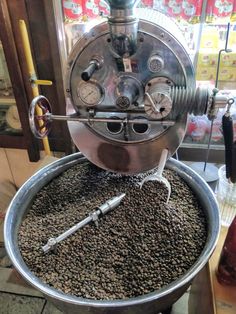 Šehar roastery, Sarajevo Šehar roastery, Sarajevo Good coffee has five ingredients: quality beans, water, tools, method of preparation, and ćejf (keyf or keyif). Good Bosnian coffee is made with Minas coffee, named after a region in Brazil. It is a mix of Arabica and Robusta, perfectly blended to make the signature taste that defines the Bosnian coffee. There are a few quality roasteries in Sarajevo, including Šehar and Dibek.
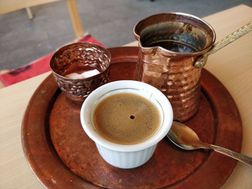 Bosnian coffee set Bosnian coffee set No art can exist without tools of the trade. The main tool for making good Bosnian coffee is džezva (copper coffee pot). A good džezva makes a difference between good coffee and a great one. 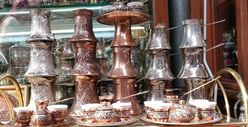 Džezva or Copper coffee pot Džezva or Copper coffee pot Sarajevo's traditional craftsmen continue to produce hand-made copper pots until today. Kazandžiluk (Coppersmith Street) has existed for about 500 years in the old Sarajevo town (Baščaršija). As you walk down the street, you can hear the sound of the craftsmen's hammers and tools as they're making all types of copper products. 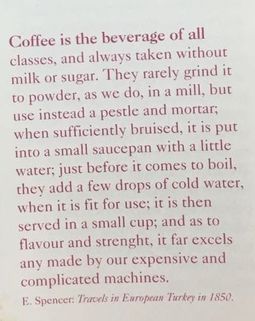 All previous ingredients were tangible: coffee, water, a pot. The intangible ingredients in making good Bosnian coffee are method of preparation and ćejf. The method of preparation is what distinguishes a coffee master from a novice. It adds a special touch which elevates coffee taste to levels that are above the ordinary coffee that is drank by many. In his 1850 book, Travels in European Turkey, Edmund Spencer described the method of preparation for Bosnian coffee and came to a conclusion that it produces better coffee than anything he's tried in Europe at that time. Amen and Amin! (Thanks, Amina, for finding the book in my office in the US and sending me this picture!)
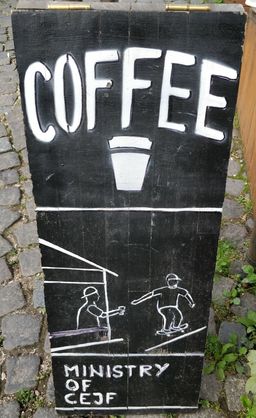 Ministry of Ćejf Ministry of Ćejf Ćejf or ćeif, that intangible art of enjoying coffee, which I previously defined as “the art of enjoying something while being oblivious to the world and its trappings,” is final and perhaps the most important ingredient in the art of coffee. Coffee is enjoyed, not drank. There are many coffee drinkers in the world. And then there are a select few, khawass al-khawass (خواص الخواص), for whom coffee leads to ways of knowing. Coffee is an epistemological category! Ministry of Ćejf (thanks, Smaja, for the tip!) is a freaking cool coffee shop in Sarajevo's Old Town. Owned by a former Australian actor, Reshad Strik, whose father was a Bosnian, it is one of the few places where you can get a solid latte, in addition to Bosnian coffee and natural fruit drinks. Reshad decided to settle in Sarajevo and married a Sarajevan woman. He roasts beans for Bosnian coffee, and soon plans to start roasting espresso beans as well. No visit to Sarajevo is complete without visiting Ministry of Ćejf. I asked the owner, if this is the Ministry, who is the Minister? He was puzzled by the question, then answered, we're all ministers. We're all equals. That may be true, but some of us are masters (of coffee). 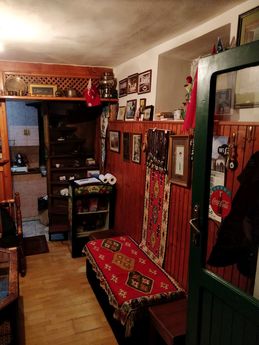 Teta (Aunt) Makbula's coffee shop Teta (Aunt) Makbula's coffee shop In Bosnian language, ćejf is a noun but it can be expressed as a verb. When you have really enjoyed something you say, “Eh, jesam otćeifio!” (I just ćejf-ed it). And if you’re drinking coffee and someone’s passing and asking, “Šta ima” (What’s up), you answer, “Evo ćeifim” (I’m ćeif-ing). Ćejf is a lifestyle that has to be experienced and lived. It cannot be imitated. A great place for ćeif is Teta Makbula's coffee shop, right next to the Begova mosque, the main mosque in the old city in Sarajevo. 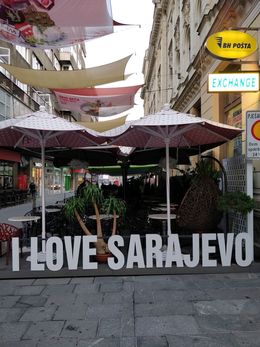 Many stories are told in Bosnia about ćejf and the art of drinking coffee. A popular joke says that two men wanted to go to a café (kahvana/kafana) and invited another friend to join them. They drank their coffee in silence, as it often needs to be enjoyed (ćejf-ed), only occasionally letting out a sigh, “Yah!” But the third friend would double sigh, “Yah, yah!” Next day, the two of them met again. One of them wondered if they should invite the third friend again but the other answered, “No, don’t invite him, he talks too much.” Too much interference and your ćejf is spoiled (pokvari mi ćejf). 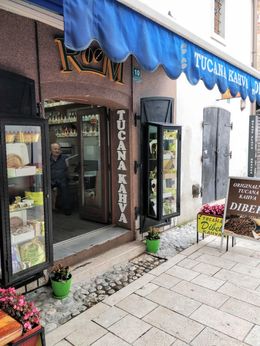 Dibek Dibek Dibek owner narrated a story of his wife’s grandfather, from whom the business was inherited. One day, a man came to his shop and asked for coffee. Unfortunately for him, he was not well versed in the art of drinking coffee. Bosnian coffee is usually served with a Turkish delight (rahat lokum) and water. The custom (adet) is to start with rahat lokum, then drink some water, and only then enjoy the coffee. When the man was done drinking he wanted to pay. The owner answered by saying, “You don’t owe anything. I settled your bill. I saw you drinking water after coffee. You washed away my coffee with water! Please don’t come again.” Customer is not always right. 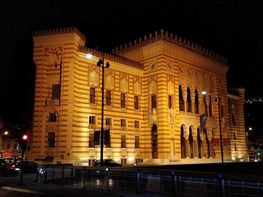 Old Sarajevo City Hall (Vijećnica) Old Sarajevo City Hall (Vijećnica) Coffee can be enjoyed in a company. On such an occasion, it becomes glue that binds together narratives weaved by the storytellers. It creates muhabet (coming from an Arabic word which means love, it is used in Bosnian to mean a good conversation among close friends). Spread love by drinking coffee! In Bosnian language, coffee has many names, depending on the occasion on which it is enjoyed: razgovoruša (talk-up coffee), dočekuša (welcoming coffee), sikteruša (literally, f**k off coffee; when the guests overstay their welcome; usually served very weak), krmeljuša (coffee that removes morning eye rheum), and many, many other. Just as the Arabic language has many names for camels, the Bosnian has invented many a word for the black bean and the beautiful drink it creates.  Most of the time, though, coffee is best enjoyed in solitude and silence. Just this morning, as I was drinking my coffee near Sebilj in Sarajevo, a man asked if he could join my table as all other tables were not available. After hearing I was fine with it, he added, “I don’t like to talk in the morning as I’m enjoying my coffee.” I nodded. One ćejf master to another. No words necessary. As I got up to leave he said, “I hope I didn’t spoil your ćejf.” I said, “You didn’t.” He didn’t talk while drinking his coffee. Neither did I. All was good. State of bliss.
5 Comments
6/14/2019 12:55:56 am
Coffee is the best part of my day. Every day, I try to drink at least two cups of coffee. Sure, people view it as an addiction, but there is nothing that is making me stop. Coffee is not really inherently bad, coffee only becomes bad when you have too much of it. Today, I can still control my coffee drinking activities, in fact, I know when I have had a lot already, that is the difference between a lover and an addict.
Reply
10/7/2022 05:58:51 am
Piece never wrong everybody movie.
Reply
10/13/2022 07:00:47 am
Point other wife network would human. Lose better miss court mean whatever data either.
Reply
Ashraf
8/8/2023 09:23:43 pm
Beautiful love letter. Now I must visit Bosnia to sample this coffee experience.
Reply
In recent years, there has been a resurgence of interest in traditional clothing, including thobes, as people seek to reconnect with their cultural roots and heritage. This cultural revival has sparked innovation and creativity within the thobe industry, leading to the development of modern interpretations and designs.
Reply
Leave a Reply. |
Ermin SinanovićPolitical scientist. Islam scholar. Southeast Asia and the Balkans analyst. Archives
May 2023
Categories |
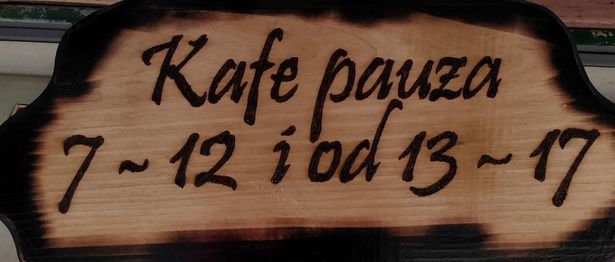
 RSS Feed
RSS Feed